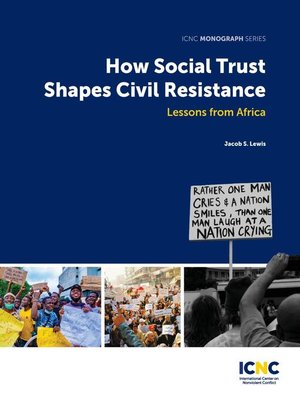
Sign up to save your library
With an OverDrive account, you can save your favorite libraries for at-a-glance information about availability. Find out more about OverDrive accounts.
Find this title in Libby, the library reading app by OverDrive.



Search for a digital library with this title
Title found at these libraries:
| Library Name | Distance |
|---|---|
| Loading... |
What role does trust play in civil resistance? Despite the growth of civil resistance literature over the past decade, little work has examined the psychological elements involved in mobilizing activists or maintaining nonviolent discipline. This monograph addresses this gap in the literature by examining two key questions: First, are individuals with higher levels of social trust more likely to participate in nonviolent demonstrations and protests? Second, are individuals with higher levels of social trust less likely than low-trusting individuals to express sentiments justifying the use of violent political action?
Using survey data gathered from multiple African countries during the current wave of protests on the continent, this study employs statistical tests and demonstrates two major findings. First, high levels of social trust correspond with increased reported willingness to participate in nonviolent protests and demonstrations. Second, high levels of social trust consistently correspond with lower expressed justifications for violent actions. The study employs two verification tests. First, it examines whether self-reported potential mobilization correlates with actual protest. Second, it tests whether regions across Africa in which residents report high levels of social trust are more likely to observe higher proportions of nonviolent resistance action than regions with low levels of social trust. The results indicate that they do.
For activists and scholars interested in better understanding how micro-level factors shape nonviolent conflict, this monograph provides initial evidence that trust is an important element in remaining nonviolent and engaging in nonviolent resistance actions.







